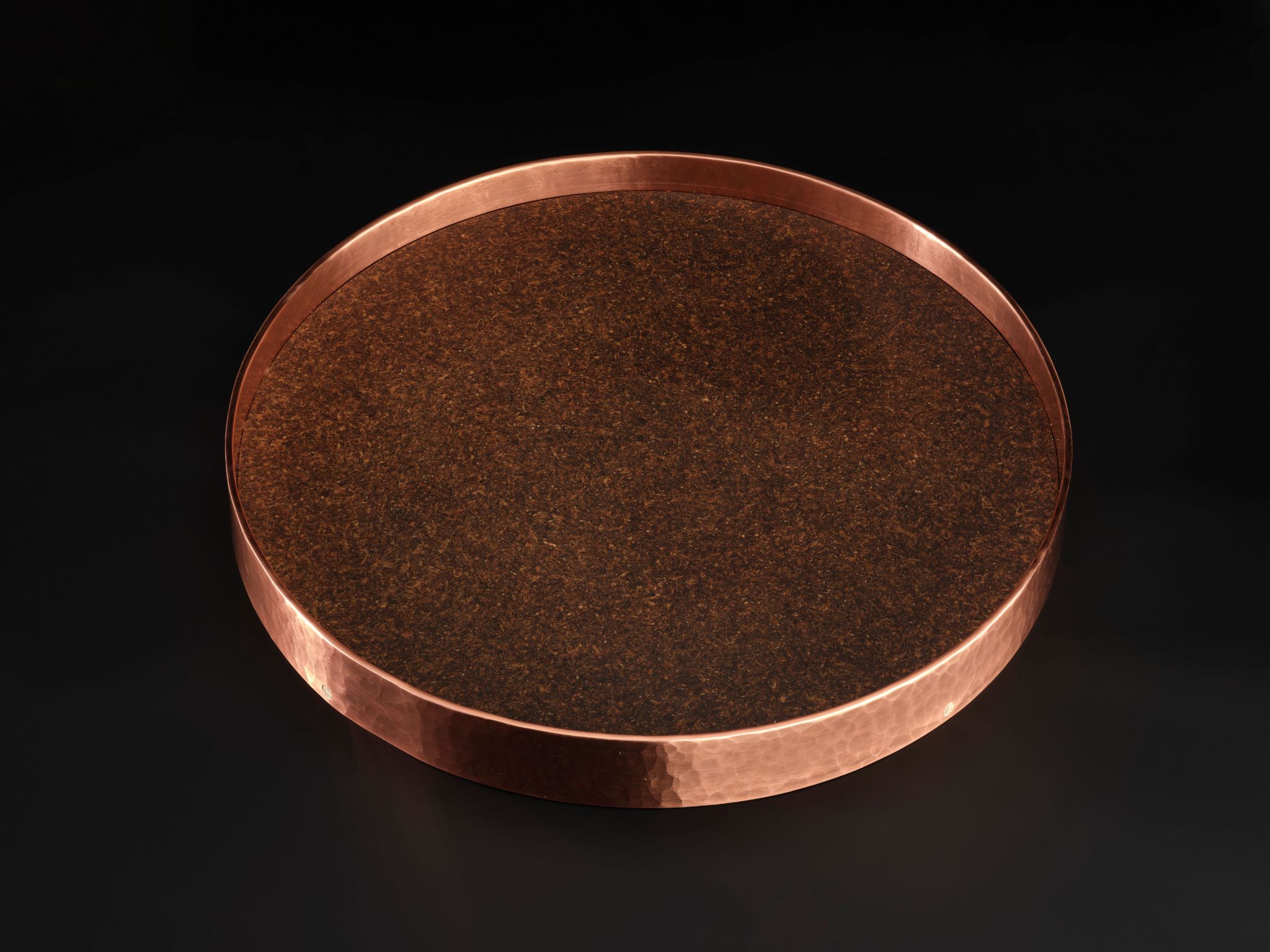Furniture made from whisky by-product added to museum collection

The commissioned drinks tray made from draff and copper
National Museums Scotland has commissioned a furniture maker from Dundee who has collaborate with coppersmiths from East Lothian to create a drinks tray from whisky by-products for the museum’s Scottish History and Archaeology collection.
Draff Studio, a sustainable bespoke fabrication furniture and design studio based in Dundee, Scotland, worked with McMillan Coppersmiths in Prestonpans to craft a special ‘draff tray’ with material sourced from Arbikie distillery and offcuts from copper still construction.
Draff, primarily barley in Scotch whisky production, is the leftover grain from the process of making alcohol. Draff Studio transforms the draff into a sheet material with similar properties to OSB and suitable for furniture-making.
Aymeric Renoud, founder of Draff Studio: “What I like about draff is that it already has a story, a narrative behind it that I’m passionate about. We often overlook the materials around us: it’s a by-product, so using it reduces waste overall.
“The quantity of spent grain we produce in Scotland is astonishing and for some breweries located in urban areas, it’s hard to get the draff collected and taken away.”
McMillan Coppersmiths created a rim for the tray from spare copper left over from the construction of whisky stills. An apprentice from the manufacturer is involved in the project: Reece Lawrie, a first-year apprentice in the mechanics design office. This is the first time McMillan Coppersmiths has been asked to make a museum piece from scratch.
Mr Lawrie said: “When I began my apprenticeship, I never thought I’d be making an item which would form part of a collection in the Museum of Scotland.
“I’ll be using the same copper we use to make whisky stills and, although this is a much smaller item, the skills needed to beat and finish the copper are exactly the same. Working with copper ties the tray in with the distilling industry. This project has been a lovely opportunity to try something different.”
Video credit: National Museums Scotland
This collaboration with Draff Studio marks the latest in a series of projects by Briggs of Burton, the parent company of McMillan Coppersmiths, to find ways to reuse spent grain. It’s a valuable resource that can have another life in various ways; over the last 20 years Briggs of Burton have conducted research with leading Brewing and Distilling Universities and delivered projects to convert it into liquid biofuel and a protein rich animal food.
Aymeric Renoud graduated with a degree in furniture design in France 12 years ago and initially came to Scotland to study at Duncan of Jordanstone College of Art and Design in Dundee. During his time in Scotland, he visited many distilleries and breweries and became interested in collecting grain.
Mr Renoud added: “The advantage of draff is its sustainability. Although a small 40cm diameter tray requires 1kg of dried grain, furniture production uses less than 1% of the leftover grain, so it’s impossible to run out of it. This material can be used for anything, from bar stools to countertops, and it lasts a long time with proper care.
“It’s unreal to think that despite not being from Scotland, I’ll now have a piece in the National Museum of Scotland.”
Dr Mhairi Maxwell, Curator of Modern and Contemporary History in the Scottish History and Archaeology Department of National Museums Scotland, said: “This is being collected as part of our Scottish History and Archaeology contemporary collecting programme, and we love how Aymeric takes a collaborative approach to making furniture, how storytelling is central to his practice.
“This is an important addition to our permanent collections directly related to Scotland’s historical, industrial and agricultural landscapes which have been shaped over generations by the whisky industry.
“This ‘Draff’ serving tray captures a compelling story of transformation. The grains in this serving tray being sourced from Arbikie distillery, who aim to be one of the most sustainable producers of whisky in the world, and the upcycled copper rim from one of the world’s oldest fabricators of whisky stills, McMillan Coppersmiths.”










